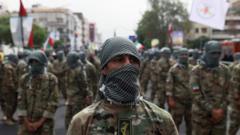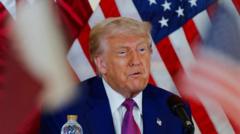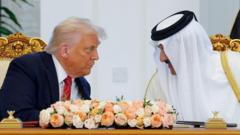President Trump's push for a softened stance on Iran's nuclear program tests his relationship with GOP hard-liners while seeking regional stability.
**Trump Seeks a New Deal with Iran Amidst Rising Tensions**

**Trump Seeks a New Deal with Iran Amidst Rising Tensions**
Trump's desire for a nuclear deal with Iran may clash with the expectations of his conservative supporters.
In an unexpected turn, President Trump has expressed a desire to negotiate a deal with Iran regarding its nuclear capabilities, indicating a potential shift in U.S. foreign policy. During a recent trip to Saudi Arabia, Trump emphasized his willingness to pursue diplomatic relations with Iran, contradicting the hardline approaches favored by many conservative factions within his party. “If I can make a deal with Iran, I’ll be very happy,” he stated, highlighting a commitment to regional stability in the Middle East.
Traditionally viewed as antagonistic, Iran has been portrayed within U.S. conservative circles as a significant threat, particularly since the 2015 agreement that limited their nuclear ambitions. Yet, amid ongoing conflicts and instability—exemplified by the ongoing situation in Gaza—Arab leaders have increasingly encouraged the U.S. to find common ground with Iran to avoid further chaos in the region. Experts cite the urgent need for a diplomatic solution, warning that both an Iran capable of developing a nuclear arsenal and a military conflict could have dire implications for neighboring states.
The potential deal with Iran raises critical questions about whether Trump can unify the more hardline elements of his base with a plan that may not fully meet their strict conditions for Iran’s nuclear program dismantlement. Recent letters from over 200 Republican congressional members urging Trump to remain tough on Iran underscore the internal pressure he faces as he seeks a pragmatic approach to diplomacy. Meanwhile, fears persist that an escalation could ignite an arms race in the Middle East, heightening the possibility of miscalculations between rival powers in the region.
Traditionally viewed as antagonistic, Iran has been portrayed within U.S. conservative circles as a significant threat, particularly since the 2015 agreement that limited their nuclear ambitions. Yet, amid ongoing conflicts and instability—exemplified by the ongoing situation in Gaza—Arab leaders have increasingly encouraged the U.S. to find common ground with Iran to avoid further chaos in the region. Experts cite the urgent need for a diplomatic solution, warning that both an Iran capable of developing a nuclear arsenal and a military conflict could have dire implications for neighboring states.
The potential deal with Iran raises critical questions about whether Trump can unify the more hardline elements of his base with a plan that may not fully meet their strict conditions for Iran’s nuclear program dismantlement. Recent letters from over 200 Republican congressional members urging Trump to remain tough on Iran underscore the internal pressure he faces as he seeks a pragmatic approach to diplomacy. Meanwhile, fears persist that an escalation could ignite an arms race in the Middle East, heightening the possibility of miscalculations between rival powers in the region.






















